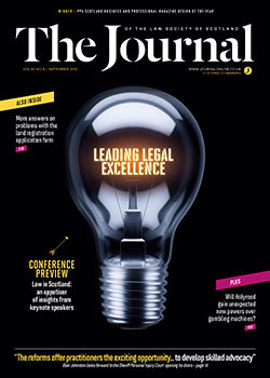Opinion: James O'Reilly (fuller version)

You may have noticed that the Law Society of Scotland recently launched a consultation on proposed reforms to the Solicitors’ Guarantee Fund, now known as the Client Protection Fund. There is a good chance that you then “triaged” this email into your delete folder on the basis that it was unlikely to be relevant to your area of practice. This would have been unduly hasty. All members should give serious consideration to the survey that was circulated on 22 July, because it could have significant and potentially costly ramifications for many in the profession.
The options considered are various, and different members will have their own views about what should be done, but if the Society is to redesign the fund, three broad questions must be asked. What is the fund for? Who should pay for the fund? And most ambitiously, what other steps can be taken to limit the extent to which claims are made?
Claims on the fund can only be made in exceptional circumstances. First of all, the loss must be occasioned by dishonesty by a solicitor or their employees. Negligence, itself rare, will not suffice, nor are trading debts covered. Secondly, no other remedy may be available. In a partnership there will be other partners whose professional indemnity should cover claims against losses caused by a dishonest partner. The fund will receive an assignation of the right to seek recompense from the individual concerned, but this is likely to be worth little.
The point of the fund for the profession, it follows, is essentially PR, albeit PR the profession is legally mandated to engage in. The fund gets its money from good solicitors and pays it out to members of the public who have been fleeced by bad ones. In many cases the solicitor whose actions led to the claim will be leaving the profession. It may be sensible to consider developing the branding of the fund in a way that firms can use it in their corporate branding.
The fund is being renamed the Client Protection Fund, and it is appropriate to consider who needs to be protected. There is an argument that recourse to the fund should be further limited, and this is addressed by the survey. As things stand, there is a limit on the amount an individual can claim, multiple times to be sure, but there is no limitation placed on who can have make claims on the fund. Whilst it is unarguable that private individuals should be protected from the cupidity of the very occasional bad apples in the profession, members will be aware that big businesses that may be worth considerably more than the profession as a whole can have recourse to the fund. It is one thing to look out for widows and orphans, but there seems to be something a little quixotic about the idea of solicitors clubbing together to put some money away in case PLCs are duped by a rogue solicitor. I would suggest that it may be worth considering whether big businesses should be required to insure against these sorts of risks in the way that they do other risks, and indeed under the current guidelines the fund will take account of the extent to which insurance does cover a loss.
The next question, if a fund is conceived from the ground up, is who pays. My own view is that it is not a good idea to stray too far from the current conceptual basis, which is that the owners of firms that handle client money are the ones who are responsible for paying into the fund. The fund in effect acts as a sort of insurance policy against a bad solicitor or employee of a solicitor stealing from a client. Some who work in-house do not have the opportunities for peculation that come with certain types of practice, so the insurance is not against their possible conduct. More than that, those who are not principals do not hire staff or form and enforce office procedures. They have no ability to stop any wrongdoing in any cashroom.
Whilst I would submit that there is a case for limiting the contributions from those whose conduct is being insured against, on the grounds it is from their number that problems the fund deals with arise and that the polluter should pay, the moral hazard argument only goes so far. The dishonest solicitor after all does not pay the client. The fund pays the client and it derives its money from the other principals in private practice and can only seek to recover funds disbursed from the bad solicitor, which may not be feasible if they have taken elementary precautions to hide the money or have simply spent it all. The reality is that the fund will be maintained through some form of capitation on solicitors or a subset of solicitors and the innocent many will pay for the wrongdoing of the few.
Another topic mooted by the consultation is that there be some sort of capital adequacy requirements. It is tempting to see this as a panacea; however one must consider what the consequences of this might be. It is of course tempting to consider that since the fund only comes into play when a solicitor is both dishonest and a man of straw, some sort of capital adequacy requirement may assist in reducing the fund’s exposure.
I have some sympathy with the concept but I also have concerns. One of the advantages of law as a profession is that it is comparatively cheap to set up a firm in terms of equipment. Most of the professions have this advantage over setting up a manufactory say, however even amongst the professions I would hazard that the costs are on the low side. Solicitors' offices are not generally filled with the sort of expensive specialist equipment that a dentist might need, and many solicitors start firms with little more than a laptop and a mobile phone by way of equipment. Increasing the cost of starting up a law firm might have an effect on the profession of tomorrow. Since the fund does not deal with trading debts, and given that firms with two or more partners would anyway have PI insurance against the risk of one partner acting dishonestly, a capital adequacy requirement would seem only really to be necessary for single partner firms which have the smallest natural size.
For similar reasons, although I welcome the idea of a debate about whether there should be a whistleblowing duty, I suspect that such a duty would not have a great impact on the extent to which the fund would be exposed to claims. One has to consider who would actually know about dishonesty on the part of a solicitor, and how would they know. In The Great Crash 1929, J K Galbraith recounted a story about the Union Industrial Bank of Flint, in which various officials who caught each other engaged in embezzlement, combined forces and got the enterprise on a more organised and profitable footing, before a poorly judged investment in the stock market made discovery inevitable. A firm in which all of the partners are engaged in dishonesty is conceivable, but outside of such a firm, the reality is that it is unlikely that other members of the profession would get the chance to know that something dishonest was being done in that such a firm unless they or their clients were affected, whilst within their own firm other partners already have the strongest possible incentive to keep the place honest. A whistleblowing duty may be a good idea generally, but I don’t think the profession has a culture of winking at dishonesty as it is.
I look forward to a robust debate within the profession about the future of Client Protection Fund and urge all colleagues to consider taking part.
In this issue
- Good health – fair question?
- Time to raise the age of criminal responsibility
- Adoption of foreign children – a clash of cultures?
- Presumed liability: the case for action
- Le Bief Bovet: 700 years of litigation
- Reading for pleasure
- Opinion: James O'Reilly (fuller version)
- Opinion: James O'Reilly
- Book reviews
- Profile
- President's column
- Land Register completion update
- People on the move
- Conference calls
- A new court rises
- Questions of form
- Charities - why reserves matter
- Place your bets
- Pensions: a formula unravelled
- Whereabouts unknown?
- Lego Man keeps his mark
- The company one keeps
- Scottish Solicitors Discipline Tribunal
- Land, leases and LBTT
- Big budget brief
- Support sought as Napier joins the law clinics
- Public Guardian's fees to increase
- Law reform roundup
- TCPD: the Update way
- How are we doing?
- Thanks, but no thanks
- Ask Ash






